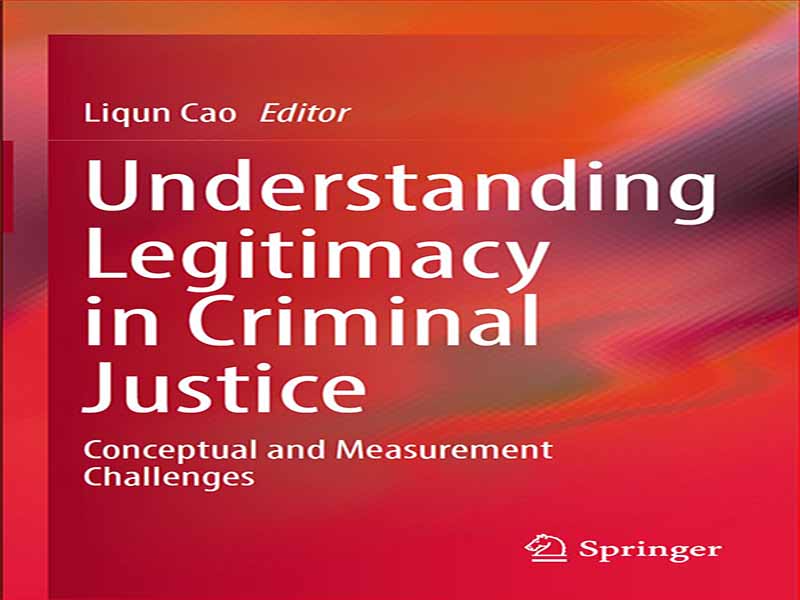- عنوان کتاب: Understanding Legitimacy in Criminal Justice
- نویسنده: Liqun Cao
- حوزه: عدالت کیفری
- سال انتشار: 2022
- تعداد صفحه: 175
- زبان اصلی: انگلیسی
- نوع فایل: pdf
- حجم فایل: 4.60 مگابایت
این کتاب ویرایش شده بهترین تحقیقات جرم شناسی و عدالت کیفری را که در حال حاضر در زمینه میان رشته ای رو به رشد مشروعیت در عدالت کیفری انجام می شود، خلاصه و ادغام می کند و به دنبال درک بهتر مفهوم سازی و اصلاح اقدامات مختلف آن است. هر یک از مشارکت کنندگان در این جلد محققی هستند که در گذشته تحقیقات تجربی مبتنی بر نظریه در مورد مشروعیت انجام داده اند. اگرچه موضوع اصلی هر فصل منحصر به فرد و محدود است، اما بحث هایی وجود دارد که به طور اجتناب ناپذیری با فصل های دیگر همپوشانی دارند. با این حال، در مجموع، فصل ها متقابلاً آموزنده هستند و انجمنی را فراهم می کنند که در آن گفتگو بین نویسندگان مشارکت کننده امکان پذیر می شود.
مشروعیت، به عنوان یک مفهوم حساس در دموکراسی، قابل آزمایش، بهبود و اصلاح است. علیرغم عدم تعریف جهانی، مشروعیت نقش مهمی در پلیس ایفا کرده است، ظاهراً از تشکیل پلیس متروپولیتن لندن در سال 1829 تا پلیس محلی امروز. علاوه بر این، در هزاره جدید، مطالعه مشروعیت راه خود را به مرکز جرم شناسی و عدالت کیفری باز کرده است (Farrington et al., 2022). این تا حدی به دلیل تلاشهای انباشته محققان، از جمله مشارکتکنندگان در این جلد ویرایششده است که این موضوع را در سراسر رشتهها و در سراسر مرزهای ملی بررسی کردهاند. مجموعه مقالات به عنوان گواهی قابل توجه بر ارزش گسترده و اکتشافی مشروعیت عمل می کند و نشان دهنده همگرایی منافع در موضوع و وضعیت تجربی آن است.
موضوع اصلی کتاب جایگزینی مشروعیت پلیس در برابر چارچوب عدالت رویه ای نیست، بلکه غنی سازی ساختار با ارائه درک متوازن تری از آن است. در حال حاضر، ادبیات مربوط به عدالت رویه ای و مشروعیت پلیس به سمت کارکرد مثبت آن متمایل است و تمایل دارد که استفاده از آنها را به عنوان یک درمان در نظر بگیرد. به این ترتیب، یکی از استدلال های این کتاب این است که مشروعیت پلیس، درست مانند عدالت رویه ای، یک شمشیر دولبه است. شکی نیست که می تواند عملکردهای مثبت زیادی ایجاد کند، اما نباید فراموش کنیم که وقتی بیش از حد از آن استفاده کنیم، می تواند ناکارآمد شود. یکی دیگر از ضعف های نظری در تحقیقات فعلی در مورد تحقیقات مشروعیت در مقابل عدالت رویه ای این است که ساختارهای اقتصادی و قومی- نژادی اغلب نادیده گرفته شده اند. آزمونهای تجربی با تکیه بر دادههای نظرسنجی تمایل دارند از تغییرات ساختاری و تأثیر آنها بر مشروعیت پلیس در مقابل عدالت رویهای اجتناب کنند. در نهایت، وجود مشروعیت بستگی به این دارد که مردم تا چه اندازه شیوه های اجرای قانون را منعکس کننده هویت قومی- نژادی و فرهنگی خود و رفع نیازهای خود بدانند.
در مجموع، فصلهای کتاب درک بهتری از پویاییهای قرن بیست و یکم در مطالعه مشروعیت را به خوانندگان ارائه میدهد. با توجه به کیفیت مشارکتها، این جلد نقطه عطفی بالقوه در ادبیات رو به رشد بینالمللی مشروعیت در جرمشناسی و عدالت کیفری است. آرزوی من این است که این کتاب نسلهای جدیدی از محققان را به بررسی عمیقتر و بینالمللیتر مسائل مربوط به مشروعیت تشویق کند. علاوه بر ارائه مرورهای کلیدی و بسط های نظری، هر فصل موضوعات و یافته های اصلی کار پیشگامانه در این زمینه را مرور و خلاصه می کند و این دانش را با سایر مشارکت کنندگان ادغام می کند. امید است خوانندگان موافق باشند که این کتاب به خوبی علایق نظری و تجربی در حال رشد در مطالعه مشروعیت را به تصویر می کشد. علاوه بر این، اگر خوانندگان و همچنین مشارکت کنندگان از این کتاب به عنوان مطالعه تکمیلی برای دوره های تحصیلات تکمیلی استفاده کنند، ممکن است به تعریف خطوط و برجستگی این موضوع برای محققان نسل بعدی کمک کند.
This edited book summarizes and integrates the best criminological and criminal justice research currently being undertaken in the rapidly growing interdisciplinary field of legitimacy in criminal justice, seeking to better understand the conceptualization and the refinement of its various measures. Each contributor to this volume is a scholar who has conducted theory-based empirical research on legitimacy in the past. Although the major theme of each chapter is unique and constricting, there are some discussions that, unavoidably, overlap with other chapters. However, taken as a whole, the chapters are mutually informative, providing a forum where dialogues among the contributing authors are made possible.
Legitimacy, as a sensitizing concept in democracy, can be tested, improved, and refined. Despite no universal definition, legitimacy has played a significant role in policing, apparently from the formation of the London Metropolitan Police in 1829 to community policing today. Furthermore, in the new millennium, the study of legitimacy has found its way into the center of criminology and criminal justice (Farrington et al., 2022). This is partially due to the cumulative efforts of scholars, including the contributors in this edited volume, who have explored this issue across disciplines and across national boundaries. The collection of the essays serves as a striking testimony to the broad and heuristic value of legitimacy, and it represents a convergence of interests in the topic and in its empirical status.
The major theme of the book is not to replace police legitimacy vis-à-vis the procedural justice framework, but to enrich the construct by providing a more balanced understanding of it. Currently, the literature on procedural justice and police legitimacy tilts toward its positive function and tends to regard their use as a panacea. As such, one of the arguments of this book is that police legitimacy, just like procedural justice, is a double-edged sword. There is no doubt that it could produce many positive functions, but we should not forget that it can become dysfunctional when taken too far. Another theoretical weakness in the current research on legitimacy research vis-a-vis procedural justice is that the economic and ethnic-racial structures have often been slighted. Empirical tests relying on survey data tend to avoid the structural variations and their impact on police legitimacy vis-à-vis procedural justice. Ultimately, the existence of legitimacy depends on the extent to which the public perceives law enforcement practices as reflecting its ethnic-racial and cultural identity and meeting its needs.
Taken together, the book’s chapters offer readers a better understanding of twenty-first century dynamics in the study of legitimacy. Given the quality of the contributions, the volume is a potential landmark in the internationally growing literature of legitimacy in criminology and criminal justice. It is my wish that this book will galvanize new generations of scholars to explore questions of legitimacy deeper and more internationally. In addition to providing key overviews and theoretical extensions, each chapter reviews and summarizes the major themes and findings of the groundbreaking work in this area and integrates this knowledge with that of the other contributors. Readers, it is hoped, will agree that this book captures well the burgeoning theoretical and empirical interests in the study of legitimacy. Additionally, if readers as well as the contributors use this book as supplementary reading for graduate courses, it may help to define the contours and salience of this topic for the next generation of scholars.
این کتاب را میتوانید از لینک زیر بصورت رایگان دانلود کنید:

































نظرات کاربران